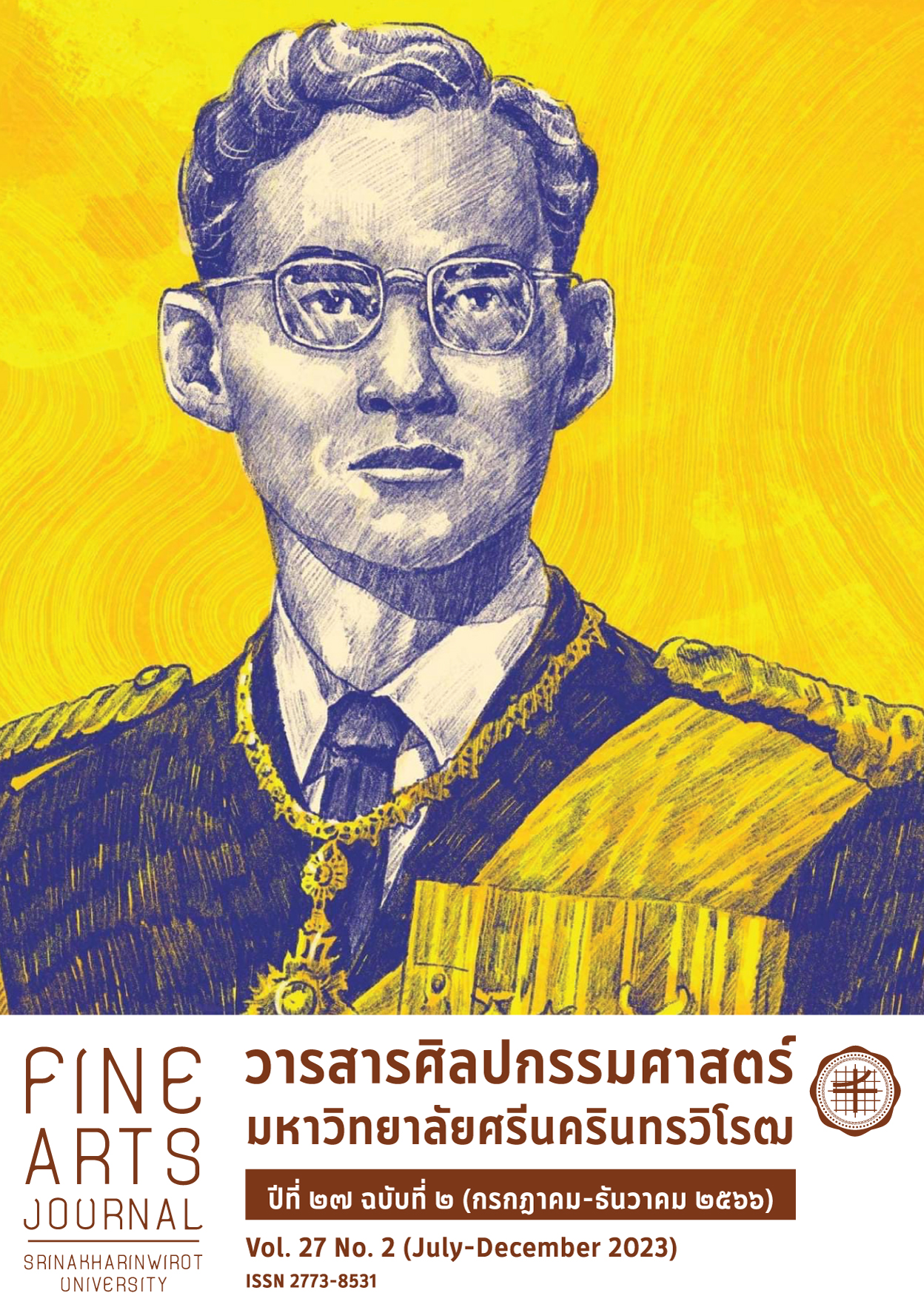THE CREATIVE DESIGN OF COSTUMES BY USING THE CORN HUSK
Keywords:
Creative, Corn husk material, Costumes, The waste of natural raw materialsAbstract
The objectives of this research article were 1) to create clothing materials from corn husks with the use of a simple process that can be managed by oneself and 2) to analyze the properties of corn husks that can be developed for the clothing design. The data collection methods were divided into two categories. The first data collection method was collecting secondary data from academic books, research studies, articles, and electronic publications that provided necessary information on fiber and textile as well as information on the works of the artists who worked with fiber and textile. Another data collection method was the 4 phases of collecting primary data. The first phase of collecting primary data was conducted in Nan Province, Thailand. The second to fourth phases were conducted in Talaad Thai market in Pathum Thani Province. The results revealed that the corn husk material had new potential to be applied as a way to create materials for clothing designs with the use of a simple process that can be managed by oneself. Also, the results of the material experiments demonstrated unique properties that can be shaped through heat and compression to create a corn husk material with 2D and 3D shapes. These results presented the potential guidelines for developing new products with the local community.
Downloads
References
กระทรวงเกษตรและสหกรณ์. (2560). ยุทธศาสตร์เกษตรและสหกรณ์ระยะ 20 ปี (พ.ศ. 2560-2579) และแผนพัฒนาการ
เกษตรในช่วงแพนพัฒนาเศรษฐกิจและสังคมแห่งชาติ ฉบับที่ 12 (พ.ศ. 2560-2564). กรุงเทพมหานคร:
สำนักงานเศรษฐกิจการแสดง, กระทรวงเกษตรและสหกรณ์. สืบค้นเมื่อ 30 สิงหาคม 2564 จาก
https://www.opsmoac.go.th/strategic-files-401191791792#:~:text=สอดคล้องกับ
สถานการณ์-,ยุทธศาสตร์เกษตรและสหกรณ์%20ระยะ%2020%20ปี%20(พ.ศ.%202560%20%2D,ยกระดับ
มาตรฐานสินค้าเกษตร
จิตติภัทร พูนขำ. (2563, มีนาคม 24). ไวรัส COVID-19 กับระเบียบโลกใหม่?. สืบค้นเมื่อ 10 พฤษภาคม
จาก https://www.the101.world/covid-19-and-new-world-order/#:~:text=นอกจาก
นี้%20Slavoj%20Žižek%20นัก,ของการประท้วงและการ
พระพรหมมังคลาจารย์ (พุทธทาสภิกขุ). (2564). เกิด แก่ เจ็บ ตาย. กรุงเทพมหานคร: เลี่ยงเชียง.
รุ่งนภา สารพิน. (2562, มีนาคม 18). ปรับตัวในยุคดิสรัปชัน. สืบค้นเมื่อ 17 สิงหาคม 2564 จาก
https://www.thaipost.net/main/detail/31567
วันชัย ตันติวิทยาพิทักษ์. (2562, มีนาคม 27). ข้าวโพด อ้อย สาเหตุหลักของหมอกควันพิษ. สืบค้นเมื่อ 7 กรกฎาคม
จาก https://www.the101.world/toxic-smog-from-corn-and-sugarcane-farming/
วรรณกิจ ตันติฉันทะวงศ์. (2562, ธันวาคม 17). “ดิจิทัล ดิสรัปชัน” คือตัวปัญหา. สืบค้นเมื่อ 10 กรกฎาคม 2564 จาก
https://www.thairath.co.th/money/economics/thailand_econ/1727105
สำนักงานเศรษฐกิจการเกษตร. (2562). สถิติการใช้ที่ดินสำหรับพื้นที่ไร่ในประเทศไทย. สืบค้นเมื่อ 4 กรกฎาคม 2564
จากhttps://www.oae.go.th/assets/portals/1/files/socio/LandUtilization2562.pdf
สำนักงานเศรษฐกิจอุตสาหกรรม. (2563). แนวทางการพัฒนาอุตสาหกรรมไทย ตามแนวคิดเศรษฐกิจหมุนเวียน
(Circular economy). กรุงเทพมหานคร: สำนักงานเศรษฐกิจอุตสาหกรรม, กระทรวงอุตสาหกรรม.
สำนักงานส่งเสริมเศรษฐกิจสร้างสรรค์ (องค์กรมหาชน). (2564). เจาะเทรนด์โลก 2022: Ready set go.
กรุงเทพมหานคร: ศูนย์สร้างสรรค์งานออกแบบ สังกัดสำนักงานส่งเสริมเศรษฐกิจสร้างสรรค์ (องค์กรมหาชน).
สืบค้นเมื่อ 18 มิถุนายน 2564 จาก https://article.tcdc.or.th//uploads/file/ebook/2564/10/desktop_th/EbookFile_33202_1634128759.pdf
Downloads
Published
How to Cite
Issue
Section
License

This work is licensed under a Creative Commons Attribution-NonCommercial-NoDerivatives 4.0 International License.






